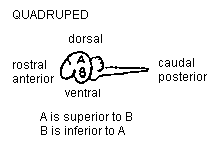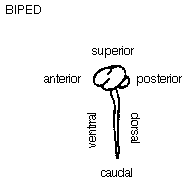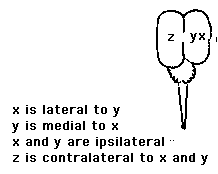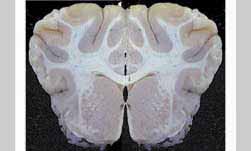


SHEEP BRAIN DISSECTION: INTRODUCTION
This manual is designed to guide
you through the dissection of the brain of a sheep. After following the
guide, you will better appreciate the three-dimensional nature of the mammalian
central nervous system (CNS). We use a sheep's brain for several
reasons: 1) the sheep's brain is sufficiently high on the phylogenetic scale
to possess those characteristics which make moving either up or down the scale
(for comparisons sake) a relatively simple matter; 2) the sheep's
brain is large enough to allow most of the features in which we are interested
to be seen with the unaided eye; and 3) sheep brains are readily available
at a minimal cost as a by-product of the meat industry.
Hints for navigating through the guide.
In order to discuss the
brain, it is necessary to use terms that are as unambiguous as possible.
Look at the following figures that contain the descriptive terminology for
direction in both quadrupeds (four-footed animals) and bipeds.
Distinguishing between these two classes of organisms is necessary because in
the biped the neuraxis (the axis of the CNS) makes nearly a ninety-degree
turn at the point at which the brain-stem merges with the spinal cord.
Spend some time studying these figures until the terms become automatic for
you.
 |
 |
 |
In addition to these terms concerning direction, we must also
use nomenclature describing the planes of dissection. Use the following figure
below to help you to learn these terms.

The final plane of dissection refers to the cuts made to the
spinal cord. This plane of dissection is known as either a
cross section or a transverse cut. Transverse
cuts section the spinal cord as one would slice a salami.
There are two principal cells in the brain: neurons and glia. Neurons account
for the two types of tissue  that
can be distinguished: white matter and grey matter. The appearance
of white matter is due to the myelin sheath found on the axons of some neurons.
In contrast, cell bodies have no myelin sheath and as a result they look grey
in color.
that
can be distinguished: white matter and grey matter. The appearance
of white matter is due to the myelin sheath found on the axons of some neurons.
In contrast, cell bodies have no myelin sheath and as a result they look grey
in color.
White matter always refers to axons,which are also sometimes referred to as fibers or fiber bundles. Here are some rules to remember about axons:
- A bundle of axons outside the CNS is called a nerve, while a
bundle of axons inside the CNS and is called a tract.
- The nomenclature of nerves allows you to know where a nerve, or tract begins, and to which structure or region it projects. The first term in the nerve or tract's name is the starting point and the second term the end point. Thus, the cortico-spinal tract is a bundle of axons that projects from the cortex to the spinal cord. The spino-thalamic tract would be a bundle of fibers carrying information from the spinal cord to the thalamus.
Grey matter refers to cell bodies.
- A cluster of cell bodies inside the CNS is called a nucleus, while a cluster of cell bodies located outside the CNS is called a ganglion.
If you have mastered the information in this section and have made study cards for each important term, proceed to Lab 1.